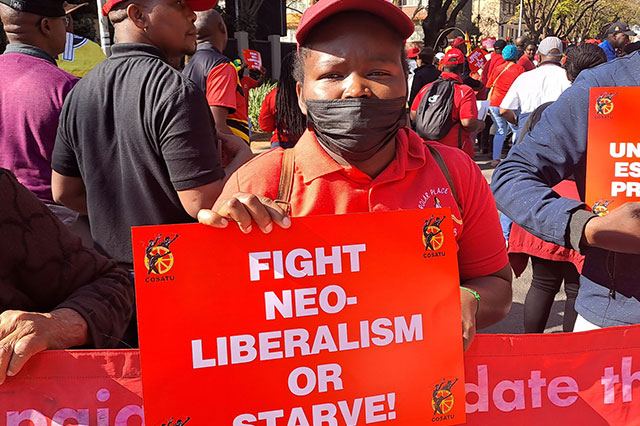Johannesburg – Protesters marched to one of South Africa’s main government building in Pretoria on Wednesday backing a national strike called by the country’s largest unions over high inflation and power cuts.
Hundreds of people blocked roads in the capital as they walked to the Union Buildings, where the presidency is located, demanding the government tackle rising living costs to prevent “economic collapse”.
“We cannot breathe,” Zwelinzima Vavi, general secretary of the South African Federation of Trade Unions told the crowd.
“We cannot compromise when we know that yesterday and today, at least 14 million people are forced to skip a meal a day… because they simply cannot afford to buy a plate of food.”
Protests in other parts of the country were much smaller, however, with union calls for a “national shutdown” largely unheeded.
South Africa has been battered by high unemployment and soaring inflation, and waves of blackouts caused by breakdowns and capacity shortfalls at state energy provider Eskom.
ALSO READ | #NationalShutdown: City of Cape Town on high alert ‘for any possible disruptions’
“It is a societal struggle,” said Mike Shingange, deputy director of the Congress of South African Trade Unions (COSATU).
Without action, “our future is doomed, the future of our young people is doomed. We have to fight now”.
Unions accuse the government of putting profits for the elite and corporate interests ahead of the interests of average South Africans.
Minister in the Presidency Mondli Gungubele, who met with the protesters, said the issues they raised had to be dealt with as a priority.
“We agree with you that unless the government deals with inequality it will be irrelevant,” Gungubele said.
On Wednesday, the national statistics agency, StatsSA, reported that inflation had reached a 13-year high of 7.8% in July.
Food and non-alcoholic beverage prices were up 9.7% and electricity tariffs grew 7.5% on average, the agency said.
Fuel prices, meanwhile, had shot up 56.2% compared to a year ago.
Unemployment stood at more than 33%, with women and the youth hardest hit.
The unions’ demands include minimum wage increases, more investment in public services such as hospitals and schools and better public transport.
Follow African Insider on Facebook, Twitter and Instagram
Source: AFP
Picture: Twitter/@__Cosatu
For more African news, visit Africaninsider.com


